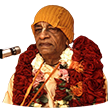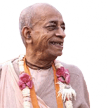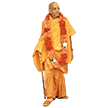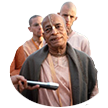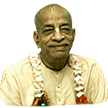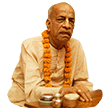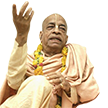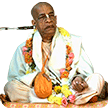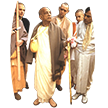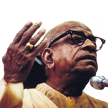Visvamitra - a glorious personality: Difference between revisions
(Created page with "Category:Glorious Personalities Category:Glorious Personalities from Bhagavad Gita Category:Glorious Personalities from Srimad Bhagavatam Category:Glorious Perso...") |
No edit summary |
||
| Line 11: | Line 11: | ||
{{Personalitiesnav}} | {{Personalitiesnav}} | ||
<!----------------- BEGIN STANDARD HEADING -----------------> | <!----------------- BEGIN STANDARD HEADING -----------------> | ||
Srila Prabhupada's books, lectures, conversations and letters reveal the qualities of this glorious personality as seen in the Vaniquotes '''[[Vaniquotes:Category: | Srila Prabhupada's books, lectures, conversations and letters reveal the qualities of this glorious personality as seen in the Vaniquotes '''[[Vaniquotes:Category:Visvamitra|Visvamitra]]''' category. An introduction from his teachings is given below in the following 10 quotes. | ||
<!----------------- END STANDARD HEADING -----------------> | <!----------------- END STANDARD HEADING -----------------> | ||
---- | ---- | ||
== Quotes from Srila Prabhupada's teachings == | == Quotes from Srila Prabhupada's teachings == | ||
<!----------------- edit quote boxes below this line -----------------> | <!----------------- edit quote boxes below this line -----------------> | ||
{{VaniQuotebox| | {{VaniQuotebox|A fight arose between Vasistha and Visvamitra. The fighting became so severe that each of them cursed the other. One of them said, "May you become a bird," and the other said, "May you become a duck"|Once Hariścandra performed a yajña for which Viśvāmitra was the priest, but Viśvāmitra, being angry at Hariścandra, took away all his possessions, claiming them as a contribution of dakṣiṇā. Vasiṣṭha, however, did not like this, and therefore a fight arose between Vasiṣṭha and Viśvāmitra. The fighting became so severe that each of them cursed the other. One of them said, "May you become a bird," and the other said, "May you become a duck." '''(Śrīmad-Bhāgavatam 9.7.7)'''}} | ||
{{VaniQuotebox| | {{VaniQuotebox|After Menaka, the celestial woman who had come to delude Visvamitra Muni, gave birth to the child Sakuntala, she left both the child and her husband and returned to the heavenly planets|After Menakā, the celestial woman who had come to delude Viśvāmitra Muni, gave birth to the child Śakuntalā, she left both the child and her husband and returned to the heavenly planets. Pūrvacitti did not remain permanently with Mahārāja Āgnīdhra. After cooperating in his household affairs, she left Mahārāja Āgnīdhra and all nine sons and returned to Brahmā to worship him. '''(Śrīmad-Bhāgavatam 5.2.20)'''}} | ||
{{VaniQuotebox| | {{VaniQuotebox|Although he (Visvamitra) was a ksatriya by birth, he became a brahmana in the very same body by the power of his spiritual achievements|Gādhi-suta, or Viśvāmitra: A great sage of austerity and mystic power. He is famous as Gādhi-suta because his father was Gādhi, a powerful king of the province of Kanyākubja (part of Uttara Pradesh). Although he was a kṣatriya by birth, he became a brāhmaṇa in the very same body by the power of his spiritual achievements. He picked a quarrel with Vasiṣṭha Muni when he was a kṣatriya king and performed a great sacrifice in cooperation with Maṭaṅga Muni and thus was able to vanquish the sons of Vasiṣṭha. '''(Śrīmad-Bhāgavatam 1.19.9-10)'''}} | ||
{{VaniQuotebox| | {{VaniQuotebox|Although Visvamitra Muni was engaged in practicing mystic yoga with closed eyes, his transcendental meditation was broken when he heard the tinkling of bangles on the hands of Menaka|It is sometimes understood that a person becomes lusty just by hearing the tinkling of bangles on the hands of women or the tinkling of ankle bells, or just by seeing a woman's sari. Thus it is concluded that woman is the complete representation of māyā. Although Viśvāmitra Muni was engaged in practicing mystic yoga with closed eyes, his transcendental meditation was broken when he heard the tinkling of bangles on the hands of Menakā. '''(Śrīmad-Bhāgavatam 4.24.12)'''}} | ||
{{VaniQuotebox| | {{VaniQuotebox|By the influence of Visvamitra, he (Trisanku) went to the higher planetary system, the heavenly planets, in his material body, but because of the prowess of the demigods he fell back downward|The son of Tribandhana was Satyavrata, who is celebrated by the name Triśaṅku. Because he kidnapped the daughter of a brāhmaṇa when she was being married, his father cursed him to become a caṇḍāla, lower than a śūdra. Thereafter, by the influence of Viśvāmitra, he went to the higher planetary system, the heavenly planets, in his material body, but because of the prowess of the demigods he fell back downward. '''(Śrīmad-Bhāgavatam 9.7.5-6)'''}} | ||
{{VaniQuotebox| | {{VaniQuotebox|Even the advanced yogi Visvamitra broke his mystic practice to unite with Menaka and beget a child known as Sakuntala. The practice of mystic yoga, therefore, is not sufficiently strong to control the senses|Even the advanced yogī Viśvāmitra broke his mystic practice to unite with Menakā and beget a child known as Śakuntalā. The practice of mystic yoga, therefore, is not sufficiently strong to control the senses. Another example is Prince Āgnīdhra, whose attention was drawn to the movements of Pūrvacitti, the Apsarā, simply because he heard the tinkling of her ankle bells. '''(Śrīmad-Bhāgavatam 5.2.5)'''}} | ||
{{VaniQuotebox| | {{VaniQuotebox|Great sages like Visvamitra also fall down as victims of women|Impersonalists, after rejecting this world as mithyā, or false (jagan mithyā), come down again to this jagan mithyā, although they take sannyāsa to increase their attachment for Brahman. Similarly, many yogīs who are attached to the localized aspect of Brahman as Paramātmā—great sages like Viśvāmitra—also fall down as victims of women. '''(Śrīmad-Bhāgavatam 4.22.21)'''}} | ||
{{VaniQuotebox| | {{VaniQuotebox|If one wants to artificially stop the activities of the senses, his attempt will be a failure. Even the great yogi Visvamitra, who was trying to control his senses by the yoga process, fell victim to the beauty of Menaka|If one wants to artificially stop the activities of the senses, his attempt will be a failure. Even the great yogī Viśvāmitra, who was trying to control his senses by the yoga process, fell victim to the beauty of Menakā. There are many such instances. Unless one's mind and consciousness are fully engaged in devotional service, there is always the opportunity for the mind to become occupied with desires for sense gratification. '''(Śrīmad-Bhāgavatam 3.27.5)'''}} | ||
{{VaniQuotebox|In that great human sacrifice, Visvamitra was the chief priest to offer oblations, the perfectly self-realized Jamadagni had the responsibility for chanting the mantras from the Yajur Veda, Vasistha was the chief brahminical priest|In that great human sacrifice, Viśvāmitra was the chief priest to offer oblations, the perfectly self-realized Jamadagni had the responsibility for chanting the mantras from the Yajur Veda, Vasiṣṭha was the chief brahminical priest, and the sage Ayāsya was the reciter of the hymns of the Sāma Veda. '''(Śrīmad-Bhāgavatam 9.7.22)'''}} | |||
{{VaniQuotebox|In the dynasty of Gadhi, the most powerful Visvamitra took birth. By dint of his austerity and penance, he became a brahmana. He had 101 sons, who were celebrated as the Madhucchandas|In the dynasty of Gādhi, the most powerful Viśvāmitra took birth. By dint of his austerity and penance, he became a brāhmaṇa. He had 101 sons, who were celebrated as the Madhucchandās. In the sacrificial arena of Hariścandra, the son of Ajīgarta named Śunaḥśepha was meant to be sacrificed, but by the mercy of the Prajāpatis he was released. '''(Śrīmad-Bhāgavatam 9.16 Summary)'''}} | |||
<!----------------- edit quote boxes above this line -----------------> | <!----------------- edit quote boxes above this line -----------------> | ||
''' | '''Visvamitra - [[Vaniquotes:Category:Visvamitra|explore more within this category]]'''. | ||
{{GloriousPersonalitiesTotal}} | {{GloriousPersonalitiesTotal}} | ||
Latest revision as of 16:15, 11 February 2017
INTRODUCTION TEXT TO BE WRITTEN
Srila Prabhupada's books, lectures, conversations and letters reveal the qualities of this glorious personality as seen in the Vaniquotes Visvamitra category. An introduction from his teachings is given below in the following 10 quotes.
Quotes from Srila Prabhupada's teachings
Visvamitra - explore more within this category.
Vanipedia has now over 215 introductory articles compiled from Srila Prabhupada's teachings under the series titled Glorious Personalities. All these articles can be seen in the Table of Content on the right side of this article and also here in this Umbrella Category. Browse through them to relish the breadth and depth of Srila Prabhupada's teachings - There is an attractive personality for everyone.
